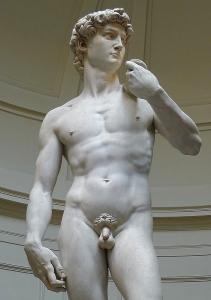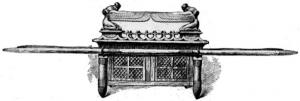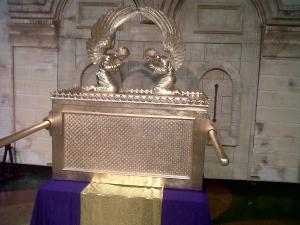Today I return to my fictional retellings of the tales of the books of Samuel, and the story for today is a doozy. As is too often the case, the lectionary collectors offer to us a dreadfully truncated account of the story of David’s transfer of the Ark of the Covenant to Jerusalem and the events surrounding the Ark’s move. What the lectionary omits is very important for the fuller context of the story; indeed, all of chapter 6 must be read to discern the range of the narrator’s rich concerns. My story will be based on the whole of the chapter.
 It had become clear to David that he needed a more complete confirmation of his new capital city of Jerusalem. It was hardly enough to have defeated the weak Jebusites in order to control the city; the king was in desperate need of a religious event, some object or token that would announce to the whole land that YHWH had chosen David as king. His high priest was forever reminding his monarch that while he was having a fabulous palace constructed by the clever and generous Hiram of Tyre, the fabled Ark of the Covenant, that hoary chest that contained the tables of the Torah that Moses himself had brought down from Sinai, had no permanent place where it could properly be honored and venerated. David was heartily sick of the pompous holy man, always dressed in his richly brocaded robe, shot through with spun gold on an azure ground, interrupting his daily bath with his sing-song voice and his pious demands for a temple. David vowed to the priest that he would build such a place, but all in good time, all in the king’s good time. But Nathan was an impatient man, and his demands could not be put off forever.
It had become clear to David that he needed a more complete confirmation of his new capital city of Jerusalem. It was hardly enough to have defeated the weak Jebusites in order to control the city; the king was in desperate need of a religious event, some object or token that would announce to the whole land that YHWH had chosen David as king. His high priest was forever reminding his monarch that while he was having a fabulous palace constructed by the clever and generous Hiram of Tyre, the fabled Ark of the Covenant, that hoary chest that contained the tables of the Torah that Moses himself had brought down from Sinai, had no permanent place where it could properly be honored and venerated. David was heartily sick of the pompous holy man, always dressed in his richly brocaded robe, shot through with spun gold on an azure ground, interrupting his daily bath with his sing-song voice and his pious demands for a temple. David vowed to the priest that he would build such a place, but all in good time, all in the king’s good time. But Nathan was an impatient man, and his demands could not be put off forever.
Well, thought David, now may be as good a time as any to secure the Holy Ark, place it in the wilderness tent—holy enough for now—and soon thereafter begin construction on a temple for the mysterious box. That should satisfy Nathan, and, David hoped, reduce the number of interactions he would have to have with the priest. David enjoyed the company of soldiers, but holy men too often made his skin crawl. It was never wise to spend too much time in the presence of such people. Too much talk of God and holy ritual, too many demands for costly places to perform the rites they claimed the God commanded.
David could readily see the value of the ancient Ark. It had long been a symbol of Israelite military prowess, having led the armies into battle for more suns than any had lived. It had once been captured by the hated Philistines, but had humiliated those insects by toppling the huge idol of their so-called god, Dagon, in his own temple and cutting off his hands and feet—no one knew how! The chastened Philistines had sent the Ark back to Israel—they wanted no part of the accursed thing—and upon its return, some foolish Israelites peered into the box and were promptly struck dead—in their thousands as the story was told. The Ark was definitely a powerful thing, and as such would serve well as the religious glue for the new city of David, Jerusalem. He simply had to get it!
He assembled a significant force of his finest warriors, and set out for the farm of Abinadab that was to be found close to the old Baal worshipping community of Baale- judah, the “Judahite Baal” shrine, since converted to an altar to YHWH. Abinadab’s two strapping sons, Uzzah and his brother, were selected to drive the Ark to the new capital city. They put the Holy Ark on a new cart with the greatest of care and whipped the huge oxen toward the Jerusalem road. Uzzah’s brother was guiding the cart when it struck a large boulder, hidden by an earthen mound in the road, and the Ark began to tip off the cart. The brother reached up his hand to steady the box, and out of a clear sky a bolt of YHWH’s power struck the brother dead!
And David was furious! “How in the world can I use this thing for my own advancement and power if its untamed nature manifests itself like this, killing an innocent boy for no reason at all?” David, as was the custom, instantly named the place of the death Perez Uzzah, since he imagined that YHWH had “broken out” against Uzzah, despite the fact it was his brother who had been slain. To add to his anger, David felt genuine fear of this mysterious YHWH. “How can the Ark of YHWH come under my control,” he mused? Maybe choosing the Ark as centralizing symbol was not such a good idea after all?
To test the potency of the thing, to find out whether or not it could finally be controlled by any human being, David left the Ark at the house of the foreigner, Obed- edom, a Gittite, a Philistine now under the thumb of the new king of Israel. And David waited three long months to see what would happen. After all, if the chest worked its power against Obed-edom, what was one more dead Philistine? But to his delight, Obed- edom and his household prospered when the Ark came to his farm, and David was convinced that the time had come to bring the box into Jerusalem.
But he took no chances. Every few steps toward the holy city, David demanded that rich sacrifices be offered to YHWH, a practice that slowed the procession to a crawl, but safety in the presence of the Ark was uppermost in the king’s mind. The king himself stripped off his robes and dressed himself in an ephod only, a tiny leather strap, barely covering his privates. And he danced wildly before the Ark, sweating and shouting, whirling around in wide circles, celebrating the entrance of the sacred chest into the new City of David. And his people in the city watched in wonder as their king, his body chiseled by years in the wilderness, performed with abandon before the Holy Ark, giving himself over completely, as they understood his dance, to the worship of the great YHWH. Of course, David thought of YHWH as much as he thought of the grand impression he was making upon his people.
But not all the people were so moved by the king’s dance. Michal, daughter of Saul, David’s wife, still though a largely forgotten woman in the harem of the king, watched in unfeigned horror as her so-called husband leaped and danced in the streets, caring not at all that his privates were regularly on display to any who longed to see more of their king. Once in the city, David ceased his dance and handed out rich presents of food to his adoring people. But when he attempted to do the same for his own household, a furious Michal confronted him, shouting, “How the king of Israel honored himself today, exposing himself before the leering eyes of his servants’ maids like any vulgar beggar!” She expected an explanation or perhaps an apology, but received neither. “I will abase myself even more, you wretch, because YHWH chose me at the expense of your father and his failed house, and appointed me prince over Israel. I may do even more wild things, and if the maids desire to watch me, well, they are more than welcome! And if they do, they will show me honor, my dear, unlike you, because this day you have seen the last of my kingly body!” And with those stinging words, the king of Israel left Michal to splutter and weep, and the poor woman had no children up to the day she died.
(Images from Wikimedia Commons)











